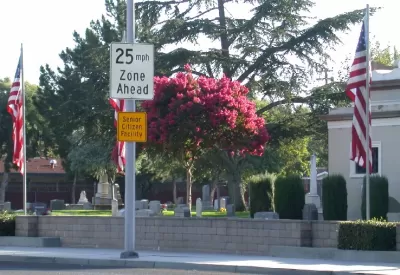In the next decade, the number of middle-income seniors who can't afford assisted living will nearly double.

Over half of middle-class seniors will be unable to access assisted living in the next decade, according to a new study.
By 2029, about 14.4 million middle-income Americans over the age of 75 will be unable to afford housing with personal care assistance—more than double the number today. In the Boston Globe, Robert Weisman explains that researchers call this group the “forgotten middle”: people who can’t afford private assisted living but also don’t qualify for subsidized home care.
"The study is seen as a springboard for a national push to create new assisted-living models and accelerate construction of assisted-living units for middle-income residents," Weisman reports.
"There's no real model for middle-income people to retire and live securely," one advocate told Weisman. Non-profits are working to create "an alternative system to support the whole baby boomer generation," which would include building more middle-income senior housing, creating new pricing models, and strengthening Medicare plans as well as retirement funds.
FULL STORY: More than half of middle-income seniors will lack resources for housing and care, study says

Planetizen Federal Action Tracker
A weekly monitor of how Trump’s orders and actions are impacting planners and planning in America.

Restaurant Patios Were a Pandemic Win — Why Were They so Hard to Keep?
Social distancing requirements and changes in travel patterns prompted cities to pilot new uses for street and sidewalk space. Then it got complicated.

Map: Where Senate Republicans Want to Sell Your Public Lands
For public land advocates, the Senate Republicans’ proposal to sell millions of acres of public land in the West is “the biggest fight of their careers.”

Maui's Vacation Rental Debate Turns Ugly
Verbal attacks, misinformation campaigns and fistfights plague a high-stakes debate to convert thousands of vacation rentals into long-term housing.

San Francisco Suspends Traffic Calming Amidst Record Deaths
Citing “a challenging fiscal landscape,” the city will cease the program on the heels of 42 traffic deaths, including 24 pedestrians.

California Homeless Arrests, Citations Spike After Ruling
An investigation reveals that anti-homeless actions increased up to 500% after Grants Pass v. Johnson — even in cities claiming no policy change.
Urban Design for Planners 1: Software Tools
This six-course series explores essential urban design concepts using open source software and equips planners with the tools they need to participate fully in the urban design process.
Planning for Universal Design
Learn the tools for implementing Universal Design in planning regulations.
Heyer Gruel & Associates PA
JM Goldson LLC
Custer County Colorado
City of Camden Redevelopment Agency
City of Astoria
Transportation Research & Education Center (TREC) at Portland State University
Camden Redevelopment Agency
City of Claremont
Municipality of Princeton (NJ)




























